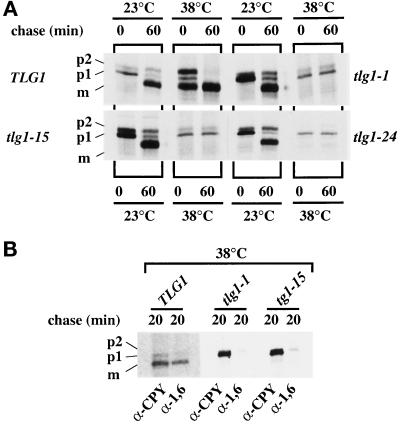Figure 4.
Transport of CPY in the early secretory pathway is affected at the restrictive temperature for tlg1 ts mutants. (A) Accumulation of p1CPY at 38°C in Δtlg1 cells bearing various tlg1 ts mutant alelles. Cells were initially grown in yeast standard minimal glucose medium (without Trp, Leu, and Met) at 23°C, after which half of each sample was shifted to 38°C for 60 min. The cultures were pulse labeled with [35S]methionine for 15 min and chased for 60 min at either 23 or 38°C. CPY was immunoprecipitated from cell lysates and analyzed by SDS-PAGE. (B) The ER/cis-Golgi form of CPY is poorly glycosylated by α-1,6-mannose-specific enzymes in tlg1 ts cells at 38°C. tlg1 ts mutants were grown at 38°C, labeled for 15 min with [35S]methionine, and chased for 20 min at 38°C. The immunoprecipitated CPY was heated at 90°C for 15 min, and the supernatants were reimmunoprecipitated with either anti-CPY or anti-α-1,6-mannose-specific antibodies. The second immunoprecipitates were analyzed by SDS-PAGE and autoradiography. The different forms of CPY are indicated on the left. p1CPY, p2CPY, and mCPY represent the ER/early Golgi, late Golgi, and mature vacuolar forms of CPY, respectively.

